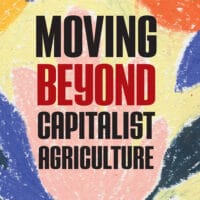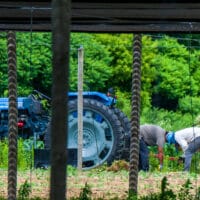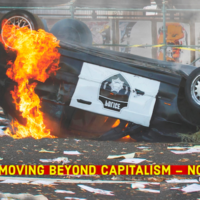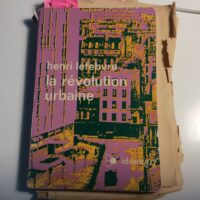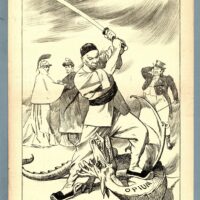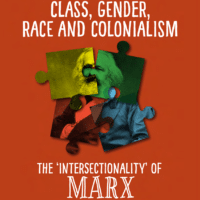-
The Opposition “Emocracy” Exposed: Kerala’s Landmark Left Victory
The landslide victory of the Left Democratic Front (LDF) in the Indian state of Kerala in April 2021 is a historic achievement.
-
Cages of Whiteness in the Shadow of Haiti: Guy Endore’s ‘Babouk’ and the Critique of Race-Class Alienation
Re-reading Guy Endore’s “forgotten masterpiece” it is striking how this novel from 1934, long-noted for its shocking and sophisticated account of slavery and resistance in the lead-up to the Haitian Revolution, is also a penetrating account of the ethical and political deformity and alienation perpetuated by the ideology of “whiteness.”
-
We Carry a New World in Our Riots
July is mid–winter in the Southern Hemisphere, where Billie Holiday singing “like a summer with a thousand Julys” rings somewhat oddly. Just the same, there was plenty of fire to keep people warm this winter.
-
A Study of Monthly Review’s Marxist Political Science in the Twenty-First Century: A View from China
Since 2000, Monthly Review has focused on the current world situation, pursuing the all-round development of Marxist studies. In this way, it has helped create a significant new trend within the U.S. left, especially in Marxist political science.
-
Monthly Review School and “The Present as History”: An Introduction
The conception of the present as history crystallized into an important principle of the intellectual tradition of Monthly Review magazine. Viewing the present as history entails combining what is new with a grasp of the longer process that is vital to a deeper understanding of the present. This Introduction provides an initiation to the intellectual tradition of Monthly Review, from which we have selected the essays and the interview that appear in The Present as History 2021.
-
Bolivarianism & Marxism: Commitment to the Impossible in Defense of Utopia
Socialist revolution throughout the world, looking to the horizon of the communist utopia, will have to collide with worldwide capitalism for that phenomenon to be overcome definitively. Socialist revolution surely will be breaking the imperialists’ chain at its weakest link, as Lenin would have said.
-
Moving Beyond Capitalist Agriculture: Could Agroecology Prevent Further Pandemics?
The current complex of COVID-induced crises fits hand-in-glove with the system’s “normal” operation. Stability has been the delusional realm of a small sliver of the Global North, awash in post-World War Two imperialism and the repeated reinvention (and re-imposition) of various plantation systems of cheap and racialized labor.
-
Imperialism, Migrant Labor, and the Nation: The Canadian Example
By centering “human capital” and providing more pathways to work and residency for higher-skilled migrants, despite lower-skilled migrant workers having a far greater desire to temporarily migrate and permanently settle, Canada is able to continually reap the benefits of both high-skilled and low-skilled labor without having to socially reproduce either.
-
Abolitionist Agroecology, Food Sovereignty, and Pandemic Prevention
COVID-19 and other zoonotic outbreaks such as Ebola are illustrative of the complex interactions between deforestation, biodiversity loss, ecosystem destruction, and human health and safety.
-
The Modern Tecumseh and the Future of the U.S. Left
Tecumseh was killed at the Battle of the Thames in 1813. His dream of an Indigenous confederacy largely died with him. Yet his appreciation of the moment and the possibilities for transformation lived on and should give us all pause.
-
Lefebvre and Althusser: Reinterpreting Marxist Humanism and Anti-Humanism
Since the October Revolution, Marxism has experienced almost as many crises as capitalism itself. Meltdowns of capitalism usually come as little surprise to savvy Marxist theorists but economic crises are one thing; economic crisis plus a global pandemic is something else again, beyond an everyday capitalist norm, more akin to the political-economy of wartime. Pandemic, like war, threatens not only life and limb, but also solidarity and tender acts of human togetherness.
-
On Paul Kingsnorth and Unruly Nature
Myth, an early and enduring human technology, will always be with us, in both unconscious and conscious forms. As we now face the slow-motion collapse of the biosphere, the call for new myths is not so much an escapist alternative to concrete analysis and action as a starting point.
-
The Revolutionary Meaning of the George Floyd Uprising
At least 28 people died in the wave of social unrest that rocked the United States from late May until late July in 2020. In this 10-week period, there were 574 riots; 624 arsons; 2,382 incidents of looting; 97 police vehicles set on fire; and 16,241 people arrested for protest-related activities.
-
Lefebvre in the Age of COVID
COVID has upended urban life as we once knew it. But it intensified already existing pathologies, those contaminating “normal,” pre-pandemic life. Our present urban reality is one of the de-encounter, a thinning down rather than thickening up, the dispersion and dilution of city life, its fear and loathing.
-
The Historical Challenges Facing the Socialist Movement
The ‘crisis of politics,’ which cannot be denied today even by the system’s worst apologists represents a profound crisis of legitimacy of the established social metabolic mode of reproduction and its overall framework of political control. This is what has brought about the historical actuality of the socialist offensive, although the pursuit of its own “line of least resistance” by labor continues to favor for the moment the maintenance of the existing order, despite the increasingly obvious inability of that order to “deliver the goods” as the once overwhelmingly accepted foundation of its legitimacy.
-
Beyond the Sprouts of Capitalism
The contemporary political economy of the People’s Republic of China, the nature of the Chinese system, has been the subject of much discussion and debate in mainstream academic, media, and political circles, as well as on the left. Yet one can only make sense of contemporary China with a clear understanding of the country’s economic history.
-
U.S. Exceptionalism Surges Again. Will It Fly?
In a statement marking the “return” of the United States to the United Nations Human Rights Council on Wednesday, Secretary of State Antony Blinken disclosed that the Biden Administration is placing democracy and human rights at the centre of American foreign policy.
-
Class, Gender, Race & Colonialism: The ‘Intersectionality’ of Marx
It is important to see both Marx’s brilliant generalisations about capitalist society and the very concrete ways in which he examined not only class, but also gender, race, and colonialism, and what today would be called the intersectionality of all of these. His underlying revolutionary humanism was the enemy of all forms of abstraction that denied the variety and multiplicity of human experience. For these reasons, no thinker speaks to us today with such force and clarity.
-
Philosophy and Technology: A Perspective from Health Care and Law
The philosophical understanding of technology historically presents a pendular characteristic, swinging between enthusiasm and fear. The control of nature, the creation of artifacts that substitute what is naturally given, and the liberating while subjugating power of technology all give rise to enchantment and apprehension, which impact the philosophical horizon.
-
Beyond Plague Urbanism
Over the centuries, humans have survived tragedy through the incredible stoicism of not moving, of standing one’s ground, of resisting, of engaging in tremendous creativity. Perhaps we can use the time alone to think collectively, to reflect together on how we might reconstruct the public realm of our cities.







